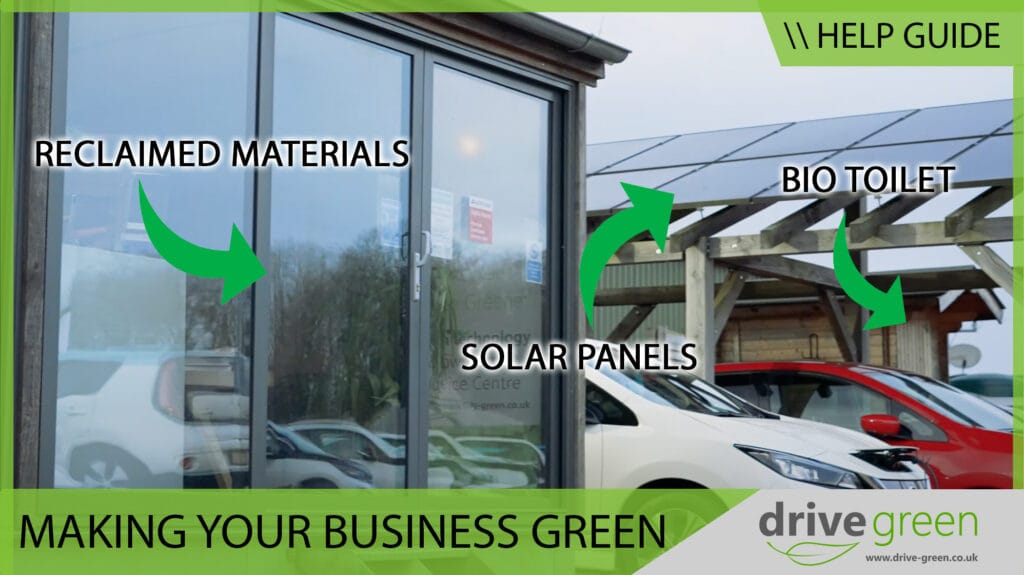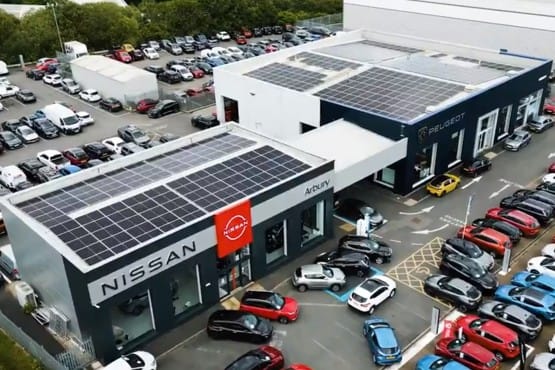Whilst there are definitely green steps that will cost a business more, on reflection, most of the things we have done at Drive Green, and the measures we have in place are actually saving us money.

Operating a more sustainable business is becoming ever more critical, for both the environment and for businesses commercially. Based on our experiences at Drive Green as well as my experience advising other companies on sustainability, here are our tips on how to start your process of making your business greener.
Overall Approach
Businesses need to treat saving carbon, just like saving money, and apply the same principles and processes to identify carbon waste that they would to identify financial waste, and then implement actions accordingly to achieve their reduction goals.
‘Treat becoming more sustainable like you would do any major business strategy’
Our sustainability ethos is ‘if there is a greener way to do something, then that is how it should be done – always – regardless of cost or effort’.

The first step is to appoint someone to manage the process of improvement, and get the staff on board. Making your business greener is a major business strategy and therefore needs to be led from the top, with senior management on board and someone with suitable authority put in place to head up and manage the implementation of sustainability strategies. Treat making your business more sustainable like any other major business project and initiative.
Set the strategy and then ‘involve’ other departments in it. Maybe a sustainability working group needs to be set-up with engaged members from every department. It can be competitive, it can be rewarded, in the same way you would reward profitability and efficiency improvements. But this is something that covers the whole business, so the strategy and the structure for achieving it needs to be set at the top, just like any other major business goal.
Staff buy-in is very important as not only will they be required to implement the strategies, they are also very useful at helping to identify areas of waste and suggesting ideas for improvement in their roles and areas of the business.
For this purpose I cannot recommend highly enough getting involved with the Carbon Literacy Project and using their carbon literacy training courses to help educate staff in the importance of working more sustainably, as well as stimulating ideas as to how this can happen and the part they play in it.
‘Getting involved with The Carbon Literacy Project is a great place to start’
Simple tasks like recycling should become part of standard inductions, as should waste identification in the same way as hazard identification. The carbon literacy training is incredibly useful, as this will do a lot of the staff training for you. This then needs to be balanced with your business’s commitments to carbon reduction. Involving staff and giving them a process for their feedback and suggestions is very important. It can also help staff feel better about their job in what is an increasingly green-focused society.


Then it is a case of auditing (constantly) all day-to-day activities to see if there is a way to do them more sustainably. From minor to big, leaving no stone unturned, and treating carbon reduction in exactly the same way you would a cost reduction audit. Look at what you’re doing and its cost in terms of carbon and waste as well as in money.
‘As greener solutions arise or are identified, they should always be adopted’
Auditing should be constant and if there is a greener way to do something that is how it should be done, so as greener solutions arise, they should be adopted.
Check out our ‘Green things we do’ page and our ‘How to make your business greener’ video for ideas of the kind of things we have done at Drive Green, both major and minor.
Some of the most important and valuable carbon reduction strategies can require substantial investment and therefore need to be higher management-led.
These are things like solar PV installations, insulation, and greener heating systems, and fleet electrification for example. Whilst costly upfront, there are substantial longer-term financial savings to be achieved.
‘There are greener power and heating solutions for all business regardless of the age of your buildings’
Do not be put off by having older premises when considering new green efficiency technologies, as like much of the UK housing stock, there are plenty of homes that are also not ideally suited to low energy use. And there are green technology solutions to suit older buildings. Solar is fine regardless of age. Biomass is a more effective carbon-neutral alternative for poorly insulated buildings, and high-temperature heat pumps and now widely available. Low-energy light is a quick return retrofit to any building, and increasing insulation where you can with green or reclaimed insulating materials will save heating costs as well as making higher efficiency greener heating technologies more viable. Treat your business as you would your home to try and make it as low in financial as well as carbon running cost.


When looking for green technology providers and installers, you should approach it in the same way that you would any supply partner, based on their reputation and value. Add on to this their green credentials, as where your money goes and then what they spend your money on is a carbon cost factor. Do your research.
Assuming that being green is not reason enough for many businesses and their shareholders, then the value of being more sustainable lies in staff morale and engagement, reduced costs, and the substantial PR and marketing advantages. Just like supporting local charities, this raises the business profile and increases brand trust. And PR is a win-win as not only is it good for the business, it also helps spread the green message using a business’s substantial voice, hopefully leading to even greater change. Businesses that are green ‘care’, and if they are caring, they can be trusted.
‘Financial savings, valuable PR, and improved staff happiness are all achievable benefits of working greener’

Being greener is not only good for the environment, but also good for your business, and I encourage everyone to start looking at implementing a strategic process to improve the sustainability credentials of their business.
